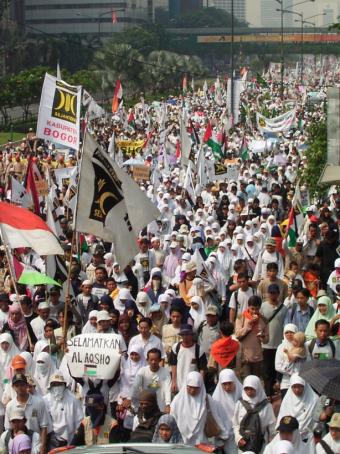Political thugs and political Islam work together in Banten
Okamoto Masaaki
In January 2008 an election was held for the head of the district of Tangerang. This sprawling industrial district on the outskirts of Jakarta is part of the province of Banten. The incumbent, Ismet Iskandar, won the popular vote. His advantages against his competitors were significant, including his incumbency, access to bureaucratic networks and what has been called the ‘Rano Karno’ factor. Ismet chose Rano Karno, a popular actor, as his running mate. It was an astute move. Using his screen persona from the popular TV program ‘Si Doel Anak Sekolahan’(Doel, the Schoolkid) of a stereotypical happy-go-lucky ethnic Betawi, Rano Karno succeeded in winning the votes of the urban lower and middle classes. It has become common in Indonesia for actors like Rano Karno to run for election, indicative of the focus upon image rather than substance in politics. In this instance, Ismet might have lost the election without Rano Karno, due to a powerful rival alliance between ‘jawara’ (the local term for thugs) and political Islam.
Jawara as powerbrokers
During the Dutch colonial period, jawara operated as a kind of rural strongman or ‘man of prowess’ living in and around villages in Banten. They were skilled in Indonesian traditional martial arts called pencak silat. Some were even believed to possess magical powers (ilmu). Jawara were part village security and part outlaw. They inhabited the underground world of bandits and thieves, and were often involved in criminal activities such as robbery and extortion. Their ambivalent status in society, plus their physical and magical abilities, gave them informal social and political power.
This informal power has continued to the present. The most influential jawara in contemporary Banten is Chasan Sochib, the self-proclaimed ‘Governor General’ of Banten. A product of Suharto’s New Order regime, he has exercised a strong political and economic influence in Banten for over three decades. The Suharto regime controlled Indonesia using a combination of ‘carrots’ (economic benefit) and ‘sticks’ (coercion). The regime made the most of private security providers such as jawara, using them as the stick to control the people and to secure state interests. In Banten, the Suharto regime co-opted jawara like Chasan, along with Islamic preachers, another ‘pillar’ of local society, offering them carrots in the form of local governmental posts, positions in local assemblies, and lucrative development projects.
During the Dutch colonial period, jawara operated as a kind of rural strongman or ‘man of prowess’ living in and around villages in Banten, skilled in traditional martial arts and possessing magical powers. Their informal power continues to the present day.
In true corporatist fashion the regime organised jawara into a single organisation called the Indonesian Association of Banten Martial Arts and Culture (PPPSBBI). Chasan was enthroned as its leader. The PPPSBBI was, like many New Order period thug groups, ostensibly a nationalist youth organisation, and Chasan constantly boasted of the PPPSBBI’s undying love for the police and military. In addition, Chasan used his position to build a successful construction company, PT Sinar Ciomas Raya. He benefitted from various development projects contracts he got in exchange for his service to the New Order state. Chasan mobilised his jawara during election campaigns to support the government party Golkar, ensuring it landslide victories in Banten. He also provided financial aid to police and military officials, and his jawara trained both in pencak silat and ilmu.
The fall of Suharto and rise of the reform movement did little to weaken his influence; on the contrary, the dynamics of post-New Order politics helped to increase Chasan’s political and economic power. After he successfully led the movement to establish Banten as an independent province by separating it from the West Java in 2000, he used a combination of coercion and pay-offs to secure the vice-governorship of the new province for his daughter, Atut, in December 2001. It was rumoured that the day before the election he bribed provincial parliamentarians. In case these bribes were insufficient, on election day, PPPSBBI jawara dressed in black and armed with machetes ‘secured’ the parliament with several jawara ‘guarding’ each parliamentarian’s car. The combination of carrot and stick worked once again, and Atut was elected by parliament as vice governor.
With his daughter in power, Chasan and his group were able to consolidate control over important bureaucratic positions and development projects in the province. Chasan’s network, comprised of jawara-cum-businessmen and bureaucrats, was known as the ‘Rau group’ as almost all of his businesses and associations were concentrated around the Rau market in the provincial capital Serang. The provincial administration was a virtual puppet of Chasan. As one provincial executive quipped, ‘we just wait for the agreement of Rau.’
Initially, the introduction of direct local head elections (pilkada) did little to reduce the Rau hegemony. Atut was elected as governor in the first direct governor election held in November 2006. During the election campaign, the Rau group further consolidated the dominance of jawara over the province by forging a new alliance with another rising jawara organisation called the Body for the Development of the Potential of the Banten Family (BPPKB) Established in 1998, the BPPKB has become an influential player in the lucrative private security industry in and around Jakarta. The Rau group also co-opted several young student activist leaders into its camp in order to gain support from youth and the urban middle class. It was these two new networks, her father’s ample funds, and the jawaras’ control over the bureaucratic machine that brought Atut to the governorship.
However, despite Atut’s victory, much to Chasan’s surprise, the combined muscle-power of the PPPSBBI and BPPKB proved less effective than expected. She won only by the slimmest of margins. It seemed it was no longer as easy to coerce or bribe one’s way into power. In part the reason for the voter swing against Atut was due to her father. Chasan may have been the figurehead of the popular movement to establish Banten as a province, but he had failed to effectively distribute material benefits to his constituency. Dissatisfaction with the Rau hegemony grew mostly in urban areas, especially Tangerang, which makes up more than 50 per cent of the province’s population and contributes a large portion of provincial income. Much of this dissatisfaction with Chasan was channeled into support for the Islamist Prosperous Justice Party (PKS).
Political acrobatics
 |
Demonstration by members of the PKS in Jakarta. Despite a
|
With a well-organised grass roots campaign platform of Islamic ethics and ‘good governance’ the PKS increased its vote in Banten from 2.6 per cent in the 1999 election to 11.9 per cent in 2004. In the election for governor, PKS campaigned for its cadre, Zulkifliemansyah as governor, who had the famous actress Marissa Haque as his running mate. The Zul-Marissa pair fared far better than expected and their jawara opponents in the Rau group were forced to take the PKS into serious political consideration when preparing for the Tangerang district head election in January 2008.
The daunting task facing the Rau group if it wanted to maintain its hegemony over Banten was to defeat Ismet, the recalcitrant district head of Tangerang. Ismet was a vehement opponent of the Rau group, mainly because the group dominated provincial government projects to such an extent that Ismet had no leeway in determining who would be recipients of projects allocated to his district. The Rau group chose Airin, the wife of Chasan’s first son, as the candidate for deputy district head. Airin was a former Miss Tourism and the people’s favourite in the Miss Indonesia beauty pageant, and she held a Master’s degree in law. The Rau group campaign focused upon her youth, beauty, and intelligence.
Because the jawaras’ former benefactor, Golkar, supported Ismet (because he was district branch head of Golkar in Tangerang), the Rau group sought out new partners. After approaching several political parties it finally made an acrobatic political readjustment, albeit a pragmatic one, by allying with yesterday’s enemy: the PKS. The political alliance between the informal social power of the Rau group and the urban-based Islamic activism of the PKS was in many ways a renewed historical alliance between local toughs and Islam in Banten. During past periods of political turmoil, such as in the revolutionary period, local ulama, Islamic scholars, had often collaborated with jawara.
As the PKS was the largest political party in Tangerang, the Rau group needed some of its votes, and hoped to benefit from the popular perception that it was a ‘clean’ party with Islamic credentials. The PKS was very keen to defeat Ismet, holding its administration in low regard. They agreed to Airin as running mate for the party’s own candidate Jazuli Juwaini, because Airin was politically marketable as a pious young Muslim woman. As a popular local Islamic scholar, Jazuli was expected to gain votes from PKS sympathisers and other pious Muslims. It was hoped that Airin would wrest some votes from Golkar supporters as the Rau group had sympathisers in the provincial Golkar branch.
PKS sympathisers hesitated to support the campaign due to specter of the Rau Group which hovered behind it.
The Jazuli-Airin pair orchestrated a huge media campaign using television, radio and newspaper advertisements. In the end, despite the media bombardment, Jazuli and Airin lost to the Ismet-Karno team by a significant margin. It seemed that the Jazuli-Airin pair was too new to the constituency and that PKS sympathisers hesitated to support them due to specter of the Rau Group which hovered behind the campaign. Perhaps most damaging for them was the circulation of a rumour prior to the election that the PKS had been tempted to join the Rau Group after being offered a sizable monetary incentive.
A new breed of politics?
The fall of Suharto and the resulting social and political upheaval made many Indonesians feel insecure, feeding the proliferation of various kinds of violent groups offering their own particular brands of ‘security’. While some such groups are ethnic-based, others cite religion as a pretext when pursuing their political and economic interests. These groups have successfully gained formal political power at the local level in places like Jakarta, Madura, Lombok and Bali. Continuing insecurity and the persistence of rampant corruption, collusion and nepotism (KKN), combined with the atmosphere of political openness, has also prompted a yearning for social justice among the Indonesian people. Through its particular brand of grass roots activism and Islamic morality the PKS has been perhaps the most successful of the post-New Order political parties to tap into this desire for a politics free of the habits of the past.
Ten years after democratisation, the birth of ‘unholy alliances’ such as the Jazuli-Airin pair are symptomatic of a new turn in local politics. The Banten case shows that while violent actors such as jawara are relying less on coercive force and more on formal politics in order to secure local monopolies, political parties such as the PKS that once appeared ‘clean’ are becoming more pragmatic and are prepared to make partnerships with groups such as the jawara. It was these two changes that resulted in the formation of the Jazuli-Airin alliance. Such political alliances, which are not limited to Banten, may become relatively stable. Ultimately, however, they reproduce the collusive practices with which Indonesians are all too familiar. ii
Okamoto Masaaki (okamoto@cseas.kyoto-u.ac.jp) is an associate professor at Kyoto University, Japan.












